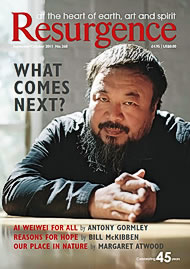I worry. I worry that it may be too late to turn things around. That life for our children may be blighted by environmental collapse. That the quality of leadership available to us today – to help shift whole societies into a radically different way of living – just isn’t up to the task. And that the one social movement that I know and love more than any other – the green movement – may also not be up to that particular task.
For all sorts of good and pragmatic reasons, the modern green movement (post Rachel Carson’s Silent Spring in 1962) came to rely more and more on one particular style of campaigning: marshalling the available scientific evidence; then building a pragmatic case for change on the basis of that evidence; enlisting the support of sympathetic citizens; and lobbying politicians or companies to change policy and practice.
A classic enlightenment approach. And as long as the evidence is sufficiently robust, that’s all we need to ensure a succession of incremental, technocratic improvements deployed in today’s political and business systems.
Yet, 50 years on from Silent Spring, how much progress did we really make? Even in the rich world, where evidence of accelerating environmental problems has been diligently deployed over decades, the majority of people are still not persuaded of the need for radical change. In developing and emerging countries, still relatively new to our Western model of progress based on year-on-year increases in consumer-driven economic growth, the idea that it can’t possibly deliver the goods for very much longer is seen as ridiculous. And, furthermore, seen by some as a wholly unjustified attempt to prevent them from enjoying the fruits of that kind of growth. (‘Eco-colonialism’ is sometimes how it is described.)
So, a harsh moment of truth. Our politicians and the electorate they serve are still firmly wedded to a model of economic progress that the evidence tells us will pitch humankind, sooner or later, into the abyss of ecological collapse. Let’s not beat about the bush: we all know this is true.
But still we persist (in the green movement) with that model of science-based advocacy. We are addicted to this particular modus operandi, based on empirical, secular rationalism, and the prospect of doing it any other way is deeply unnerving.
Don’t get me wrong. I’m not suggesting that we give up on the science – particularly in the United States, where the battle over the role of science in society is reaching a critical stage. But I am suggesting that we shouldn’t any longer put all our eggs in this particular basket – and there’s no doubt that Rabindranath Tagore, as we have seen, has plenty to teach us about the other baskets that we might make more effective use of.
Let’s just think about ‘special’ places for a moment. Much of Tagore’s writing (both prose and poetry) emphasises the spiritual connectivity between people and the places where they live and work. What makes those places special is not some formal designation (Areas of Outstanding National Beauty, for instance), but the depth and continuity of the relationship that people have with them.
We’ve just witnessed a classic example of what happens when politicians fail to understand the power of place in the recent furore over the attempt by Britain’s coalition government to sell off the whole of the Public Forest Estate in England. Hundreds of thousands of people rose up and local campaigning groups reacted in fury to the suggestion that the government might sell them the local woodlands and forests that they felt were already theirs anyway – “Ours, but not ours to sell”.
Without exception, the UK’s leading NGOs got this entirely wrong. They sat on the sidelines of the debate, wittering on about management issues (“This isn’t about ownership; it’s about the right kind of management”) and sidling up to ministers to explore how they (and their members) might benefit from the proposed sell-off.
For me, it represented a disgraceful betrayal. Their response was clinical, calculating. There was no passion about the actual places themselves, no sense of rooted involvement; just a cold, deracinated, technocratic managerialism. In the end, they were shamed by ordinary people’s outcry of rage, by their ability to articulate a deep, visceral connectivity between them and their woodlands.
Environmentalist Vandana Shiva provided us with a powerful reflection on this theme in a recent issue of Resurgence (No. 266), which was dedicated to the perennial wisdom of Tagore: “For Tagore, our relationship with the forest and Nature is a relationship that allows us to experience our humanity. He writes: ‘In all our dramas…Nature stands on her own right, proving that she has her great function, to impart the peace of the eternal to human emotions.’ It is this permanence, this peace, this joy of living, not by conquest and domination, but by coexistence and cooperation, that is at the heart of a forest culture… The conflict between greed and compassion, conquest and cooperation, violence and harmony that Tagore wrote about continues today. And it is the forest that can show us the way beyond this conflict by reconnecting to Nature and finding sources for our freedom.”
But will our NGOs have learnt the lesson of the coalition government’s ‘forest fiasco?’ I’ve seen little sign of it so far.
That’s just one tiny example. But it’s symbolic of a deeper problem in today’s green movement, where a chronic form of dualism persists: you either take a secular, empirical approach to contemporary environmental problems, or you seek to address those problems with a more values-based and spiritual orientation. It’s a real either/or world, not both/and – often characterised by a rather brittle intolerance of those on the ‘wrong’ side of the either/or dichotomy. This would have astonished Tagore. His was a world (and a holistic worldview) where science and spirituality cohabited in a deeply creative and inspiring way.
There are many other dimensions to this challenge for the green movement, and I’m heartened by the fact that there are now many more people prepared to explore them in order to tease out some conclusions for the way we evolve our campaigning strategies. After all, another 50 years of the same old head-banging frustration is just too grim a prospect to bear!








